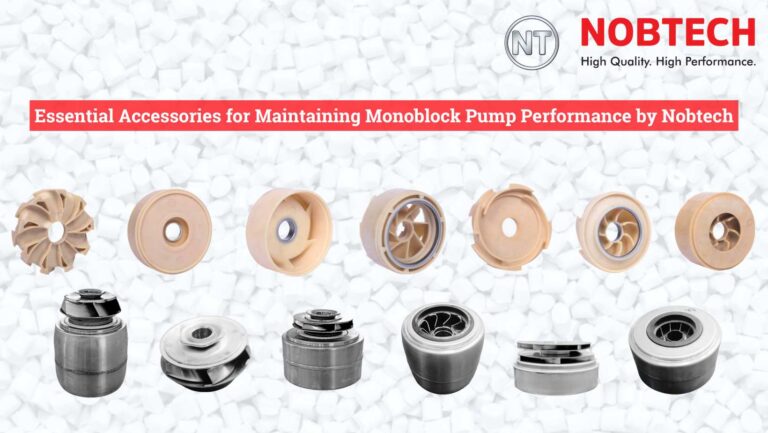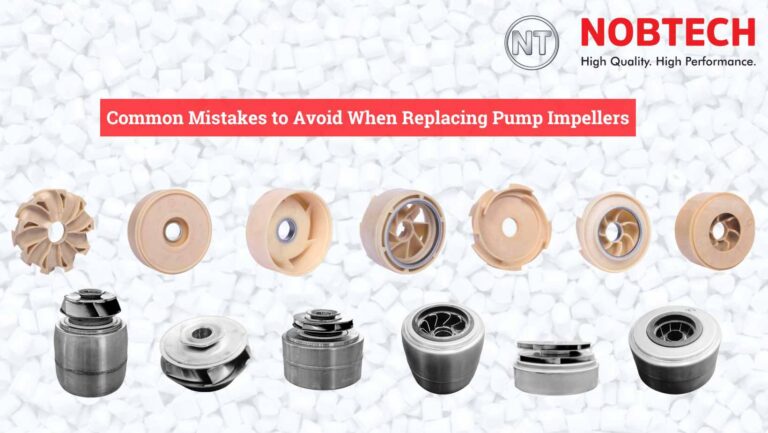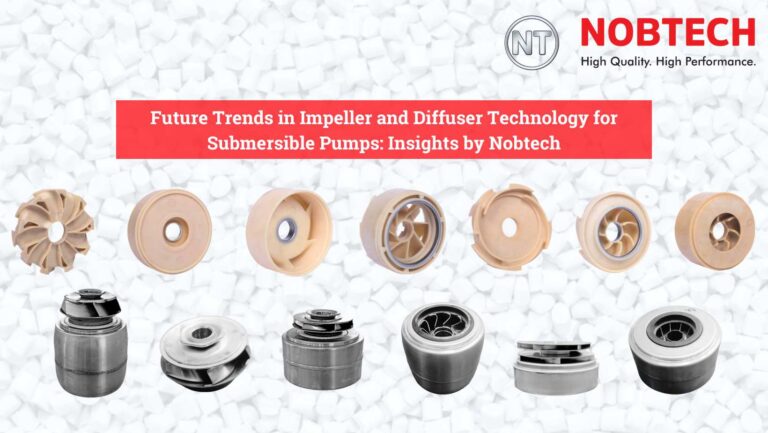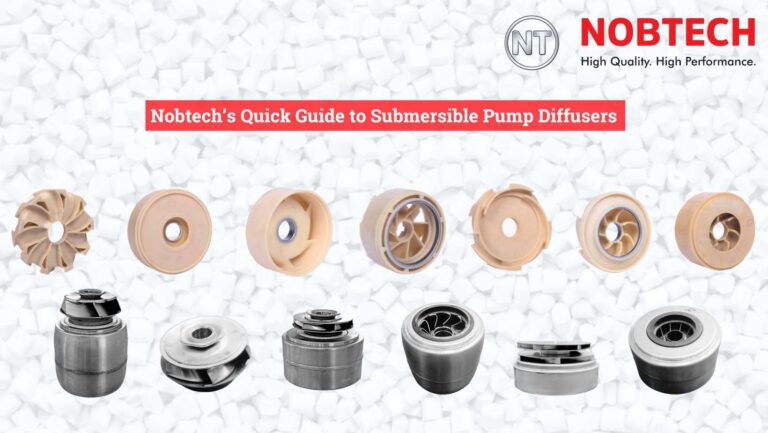Noryl Impellers vs. Stainless Steel (SS) Impellers | Choosing the Right Impeller for Your Application
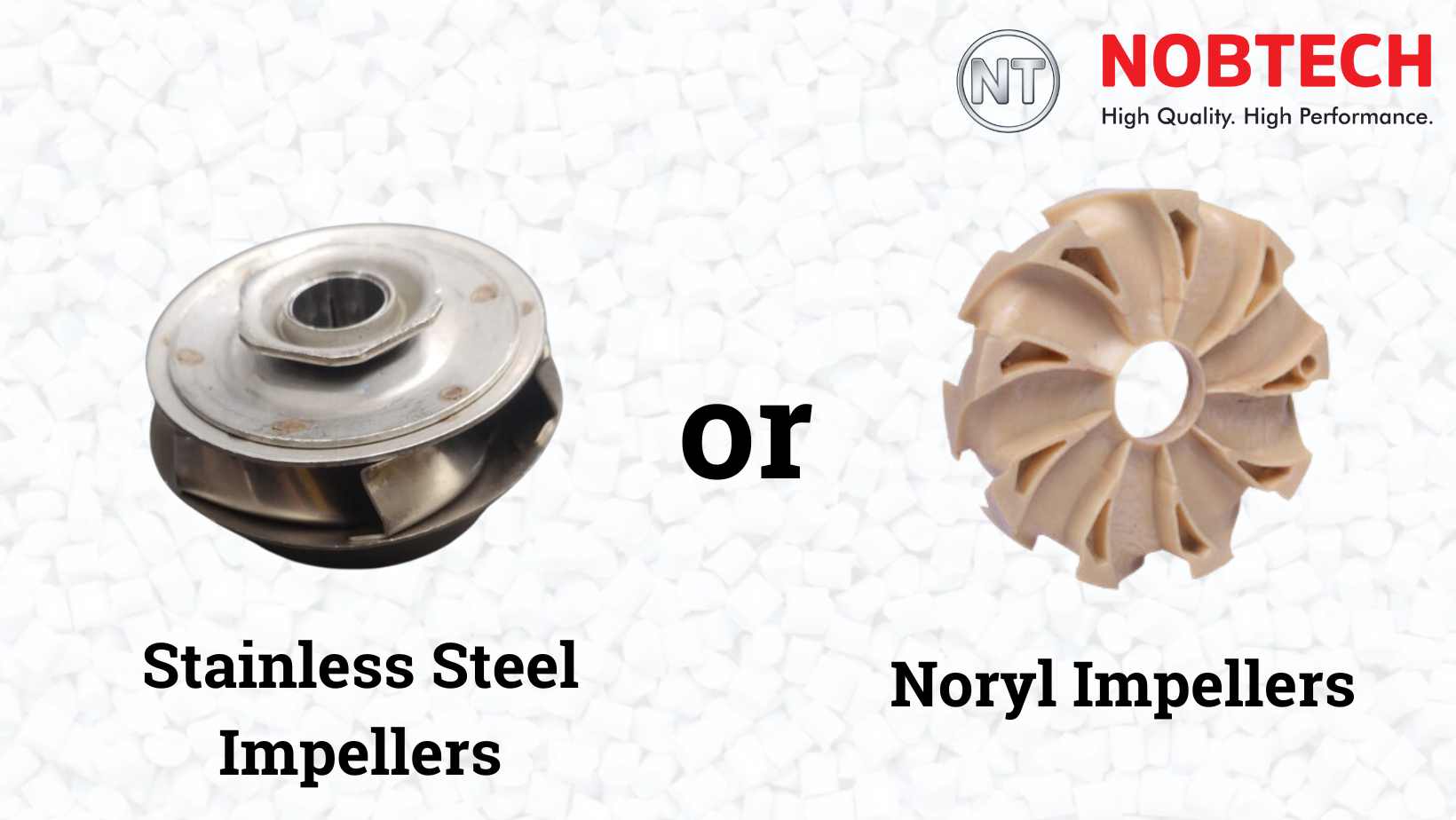
Introduction
In the world of pumps and mixers, what the impeller is made of really matters. It affects how well they work, how long they last, and how good they are overall. There are two main materials for impellers: Noryl, which is a type of plastic, and stainless steel, which is a metal mix. In this guide, we’ll talk about what’s good and not so good about both Noryl Impellers vs. Stainless Steel. This will help you choose the right impeller for your job.
Noryl Impellers: The Thermoplastic Workhorse
Noryl impellers are crafted from a high-performance thermoplastic known as polyphenylene oxide (PPO). These impellers have found widespread use across various industries due to their unique properties.
1. Chemical Resistance:
Stainless steel has a remarkable ability to resist corrosion.. They can withstand exposure to a wide range of corrosive substances, making them the material of choice for applications involving aggressive chemicals and acids. This property is particularly crucial in industries such as chemical manufacturing, wastewater treatment, and plating.
2. Electrical Insulation:
Noryl is an excellent electrical insulator, making Noryl impellers ideal for applications where electrical conductivity must be avoided. This feature is valuable in industries like electronics and telecommunications, where minimizing electromagnetic interference is critical.
3. Weight Advantage:
Noryl impellers are considerably lighter than their stainless steel counterparts. This weight advantage is beneficial in applications where reducing the overall weight of the equipment is essential. For instance, in portable pumps and mixers, the lightweight Noryl impellers contribute to ease of handling and mobility.
4. Cost-Effective Solution:
Cost-conscious industries often prefer Noryl impellers due to their affordability. Noryl is generally more budget-friendly than stainless steel, making it an attractive option for businesses looking to minimize equipment costs without compromising performance.
5. Temperature Limitations:
While Noryl excels in chemical resistance, it has limitations when it comes to temperature resistance. Noryl impellers are not suitable for applications involving high temperatures, as they have a lower temperature tolerance compared to stainless steel.
6. Mechanical Strength:
Noryl impellers may not be as mechanically robust as stainless steel impellers. In high-stress or high-impact applications, they may exhibit reduced durability, which is a crucial factor to consider when choosing an impeller material.
Stainless Steel (SS) Impellers: The Durable Metallic Choice
Stainless steel impellers, made from corrosion-resistant metal alloys, offer a different set of advantages and considerations.
1. Corrosion Resistance:
Stainless steel has a remarkable ability to resist corrosion. It can withstand exposure to a broad spectrum of corrosive substances, making it suitable for applications where chemical resistance is paramount. Industries like food processing, pharmaceuticals, and water treatment often opt for stainless steel impellers.
2. Strength and Durability:
Stainless steel impellers are known for their mechanical strength and durability. They can endure heavy loads, abrasive materials, and high-stress environments, making them an ideal choice for applications where robustness is crucial.
3. Temperature Resistance:
Unlike Noryl, stainless steel impellers can handle high temperatures with ease. This makes them suitable for applications involving elevated temperatures, such as industrial heat exchangers and high-temperature chemical processes.
4. Electrical Conductivity:
Stainless steel is an electrical conductor, which can be advantageous in applications where electrical grounding is necessary. However, it may not be suitable for situations where electrical insulation is required.
5. Weight Considerations:
Stainless steel impellers are heavier than Noryl impellers. While this added weight can be a drawback in portable equipment, it can also provide stability and durability in stationary applications.
6. Cost:
Stainless steel impellers tend to be more expensive than their Noryl counterparts. The higher cost is primarily due to the material’s inherent strength, durability, and corrosion resistance.
Noryl Impellers vs. Stainless Steel
| Characteristic | Noryl Impellers | Stainless Steel Impellers |
|---|---|---|
| Material | Thermoplastic (Noryl) | Stainless Steel Alloy |
| Chemical Resistance | Excellent resistance to a wide range of chemicals | Exceptional corrosion resistance to various corrosive substances |
| Electrical Properties | Excellent electrical insulator | Electrical conductor |
| Weight | Lightweight | Heavier |
| Cost | Cost-effective | More expensive |
| Temperature Resistance | Lower temperature tolerance | High-temperature resistance |
| Strength and Durability | Less mechanically robust | Strong and durable |
| Application Examples | Chemical handling, electrical insulation, cost-sensitive applications | Corrosive environments, high-temperature applications, heavy-duty operations |
| Industries | Wastewater treatment, electronics, cost-sensitive industries | Food processing, pharmaceuticals, water treatment, high-stress applications |
This chart provides a quick reference for the primary differences between Noryl and stainless steel impellers, helping you decide which material is better suited for your specific application.
Choosing the Right Impeller for Your Application:
The decision between Noryl and stainless steel impellers hinges on several critical factors:
1. Chemical Compatibility: If your application involves exposure to aggressive chemicals, Nobtech Noryl impellers are the preferred choice due to their outstanding chemical resistance.
2. Temperature Requirements: For high-temperature applications, stainless steel impellers are the better option, as they can withstand elevated temperatures that would deform Noryl impellers.
3. Mechanical Stress: In environments with heavy mechanical stress or abrasive materials, Nobtech stainless steel impellers are more durable and better equipped to handle the demands of the application.
4. Electrical Properties: Consider whether electrical conductivity or insulation is required in your application. Noryl is an insulator, while stainless steel is a conductor.
5. Weight Constraints: If minimizing weight is essential, Nobtech Noryl impellers provide a lightweight solution, especially beneficial in portable equipment.
6. Budget: Budget constraints are a crucial factor. Nobtech Noryl impellers are generally more cost-effective, making them a viable option for businesses looking to control equipment costs.
Conclusion:
In the world of fluid handling and industrial processing, the choice between Noryl impellers and stainless steel impellers is far from one-size-fits-all. Each material brings a unique set of properties to the table, making it well-suited for specific applications. To make an informed decision, carefully assess the requirements of your application, taking into account factors such as chemical compatibility, temperature resistance, mechanical stress, electrical properties, weight considerations, and budget constraints. By doing so, you can select the impeller material that best aligns with your needs and ensures the optimal performance and longevity of your equipment.
Wrapping Up!
This blog shares a lot about “Noryl Impellers vs. Stainless Steel (SS) Impellers: Choosing the Right Impeller for Your Application”
To know more about solar pumps in agriculture, visit-slekaind.com/our-products/
To know more about Noryl impellers and diffusers, do visit- https://nobtech.in/products/

